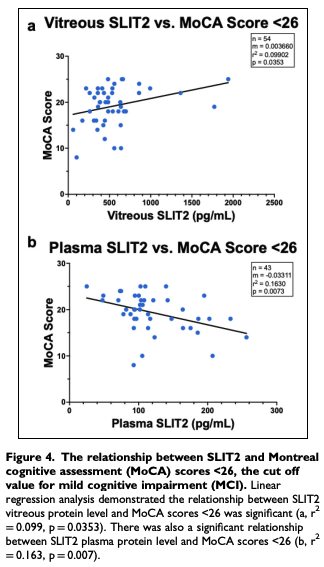Protein Found in the Eye and Blood Significantly Associated with Cognition Scores
Research
Protein Found in the Eye and Blood Significantly Associated with Cognition Scores
May serve as a biomarker for the detection of mild cognitive impairment, early dementia.
Neurocognitive impairments are classified by pathological changes with potential for destruction of neural tissue. One change known to occur in neurodegenerative disorders is an accumulation of proteins causing pathological damage.
While prior reports have suggested a link between Slit Guidance Ligand 2 (SLIT2) protein levels and late-onset dementia and Alzheimer’s disease, these findings have not been validated by a current commercially available SLIT2 immunoassay. Additionally, there is no currently published data on SLIT2 protein levels in an early-onset dementia population.
A new study by researchers at Boston University Chobanian & Avedisian School of Medicine and Boston Medical Center has shown that in middle-aged individuals, there is a significant association between levels of SLIT2 protein in both vitreous humor (the gel-like substance in the eye) and plasma (blood) and neurocognitive test scores. This is the first study to report relative concentrations of SLIT2 in vitreous and plasma and establish an association between SLIT2 levels from both sources with cognitive function.
 Manju Subramanian, MD
Manju Subramanian, MD“The association between SLIT2, which is highly expressed in the eye’s retina, and cognitive status has not been previously investigated. Our findings demonstrate the potential of ocular fluids as a sampling source for early detection and diagnosis of neurodegenerative disease,” explains co-corresponding author Manju L. Subramanian, MD, associate professor of ophthalmology at the school.
Seventy-nine individuals with an average age of 56 underwent eye surgery along with neurocognitive assessments. Samples of their vitreous humor and plasma were collected and then analyzed by a custom-designed highly sensitive Meso Scale Discovery (MSD) SLIT2 electrochemiluminescence immunoassay. Immunoassays use antigen-antibody reactions to measure the presence and concentration of specific substances in biological samples. Associations between SLIT2 levels in vitreous humor and plasma were analyzed using GraphPad Prism.

The researchers found lower levels of SLIT2 in vitreous humor to be associated with lower scores on the Montreal Cognitive Assessment (MoCA), a screening tool for cognitive impairment, as well as the Immediate Recall Verbatim z-score, a measure of verbal memory. Conversely, higher levels of SLIT2 in plasma were associated with lower MoCA scores. Notably, the vitreous humor contains up to seven times more SLIT2 than plasma. The levels of SLIT2 in the vitreous humor and plasma did not show a correlation with each other.
“We found the association between SLIT2 levels and neurocognitive scores remains significant even after accounting for various demographic factors like age, sex, race, and health conditions such as diabetic status, diabetic retinopathy, glaucoma and Apolipoprotein E (APOE) genotype,” says Weining Lu, MD, associate professor of medicine, pathology and laboratory medicine at the school.
These findings appear online in the Journal of Alzheimer’s Disease. The abstract was presented at the 2025 ARVO Annual Meeting, held in Salt Lake City, Utah, this past May.